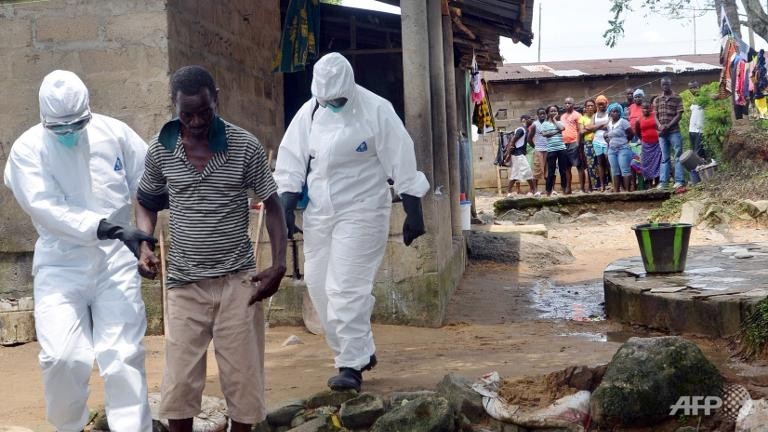Senegal confirms first Ebola case as outbreak hits 5th W African country

Nurses escort a man infected with the Ebola virus to a hospital in Monrovia, Liberia, August 25, 2014. (AFP/Zoom Dosso)
DAKAR: The Ebola epidemic that has killed more than 1,500 people across West Africa spread to a fifth country in the region on Friday (Aug 29) with the first confirmed case of the deadly virus in Senegal.
The case marks the first time a new country has been hit by the outbreak since July and comes a day after the World Health Organisation (WHO) warned the number of infections is increasing rapidly.
Senegal's health ministry said the patient is a young Guinean man who was immediately quarantined at a Dakar hospital, where he is in a "satisfactory condition".
The man is believed to have been infected in Guinea's capital Conakry, and may have travelled to Senegal before Dakar closed its land border with Guinea on August 21. Authorities are now scrabbling to piece together where he went and who he encountered, in a bid to halt the spread of the deadly virus.
New figures released by the WHO on Thursday revealed the massive scale of the crisis, which it said indicated a "rapid increase still in the intensity of transmission" that could cost at least US$490 million (370 million euros, S$612 million) to tackle.
In a sign that affected countries are struggling to stop its spread, the UN agency said the number of cases could exceed 20,000 before the epidemic is brought under control.
UNDER SURVEILLANCE
Never before has there been an Ebola outbreak so large, nor has the virus - which was first detected in 1976 - ever infected people in West Africa until now. As of August 26, 1,552 people had been confirmed dead from Ebola in four countries - Sierra Leone, Liberia, Guinea and Nigeria.
Liberia was the worst affected with 694 deaths; 422 people have died in Sierra Leone; and 430 in Guinea, where the virus emerged at the start of the year. Nigeria has now recorded six deaths.
The Democratic Republic of Congo has also confirmed two cases of Ebola, but officials there insist it is unconnected to the current outbreak in West Africa.
Nigeria's latest death - in the southeastern oil city of Port Harcourt - was the first outside its biggest city, Lagos, and dashed hopes that the country had successfully contained the virus. The victim, a doctor named Ikyke Samuel Enuemo, is believed to have caught the virus from a patient he treated who travelled to the city after coming into contact with an infected Liberian-American man.
Some 160 people are now under surveillance in Port Harcourt following the doctor's death, the local government said on Friday.
A SHIELD AROUND THE REGION
In a bid to stop the spread of the virus, many African governments have sought to ring-fence Sierra Leone, Guinea and Liberia. But member states of the West African regional bloc ECOWAS complained on Thursday that some of the security measures taken by other countries, including travel bans, had unfairly hit the region.
A number of airlines, including Air France and British Airways, have suspended their services to Freetown and Monrovia, the capitals of Sierra Leone and Liberia respectively.
Bruce Aylward, the WHO's head of emergency programmes, said it was "absolutely vital" that airlines resume flights because bans were hindering the emergency response.
The outbreak has also caused sporting chaos, with Sierra Leone having to field all players for the qualifying games for the African Cup of Nations from outside the country over a growing quarantine. Morocco, which will host the tournament next year, said on Friday it was launching a national commission tasked with drawing up a health plan to deal with the risk from Ebola.
Scientists meanwhile said the first human trials of a potential vaccine will start next week using a product made by pharmaceuticals giant GlaxoSmithKline and the US government.
On Friday, scientists writing in the journal Nature said 18 lab monkeys given high doses of the Ebola virus fully recovered after being given the prototype drug ZMapp, which reversed bleeding in the animals.
ZMapp has been given to a handful of frontline health workers who have contracted Ebola, two of whom have recovered, and two of whom have died. Three others are still receiving the treatment.
What the stars mean:
★ Poor ★ ★ Promising ★★★ Good ★★★★ Very good ★★★★★ Exceptional
Latest News
More News
- Russian President congratulates Vietnamese Party leader during phone talks (January 25, 2026 | 09:58)
- Worldwide congratulations underscore confidence in Vietnam’s 14th Party Congress (January 23, 2026 | 09:02)
- Political parties, organisations, int’l friends send congratulations to 14th National Party Congress (January 22, 2026 | 09:33)
- 14th National Party Congress: Japanese media highlight Vietnam’s growth targets (January 21, 2026 | 09:46)
- 14th National Party Congress: Driving force for Vietnam to continue renewal, innovation, breakthroughs (January 21, 2026 | 09:42)
- Vietnam remains spiritual support for progressive forces: Colombian party leader (January 21, 2026 | 08:00)
- Int'l media provides large coverage of 14th National Party Congress's first working day (January 20, 2026 | 09:09)
- Vietnamese firms win top honours at ASEAN Digital Awards (January 16, 2026 | 16:45)
- ASEAN Digital Ministers' Meeting opens in Hanoi (January 15, 2026 | 15:33)
- ASEAN economies move up the global chip value chain (December 09, 2025 | 13:32)
















 Mobile Version
Mobile Version